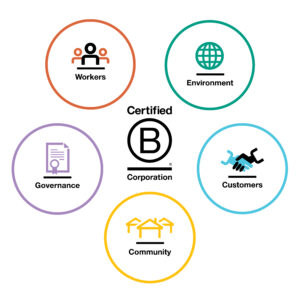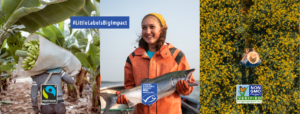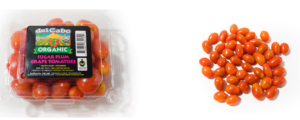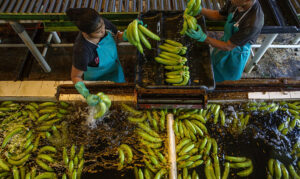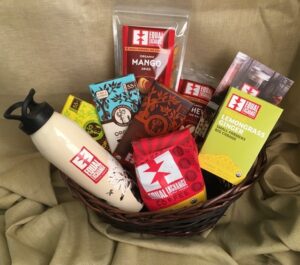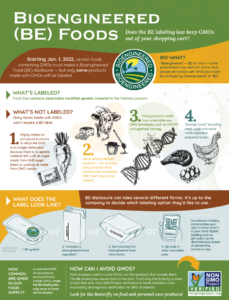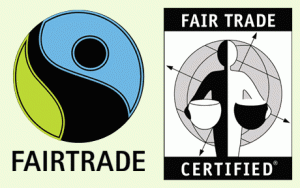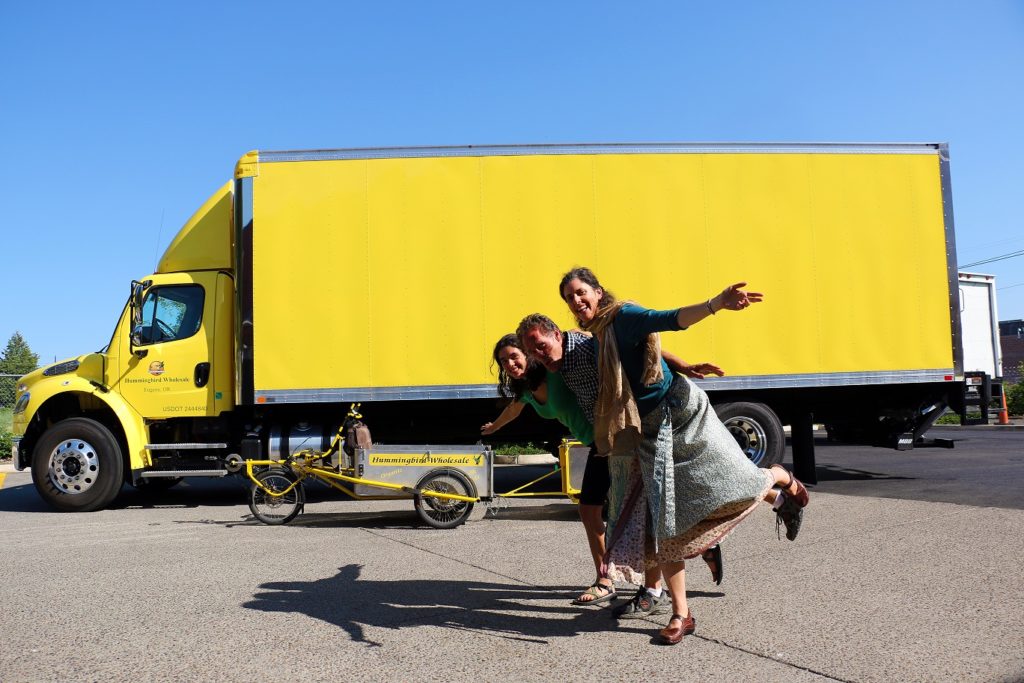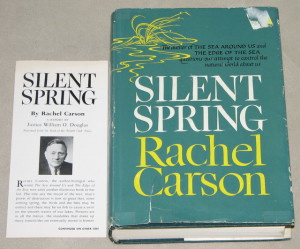Have you ever seen a B logo on a product and wondered what it means? B-Corporations have been put through a rigorous set of social and environmental standards to ensure that they positively impact workers, communities, customers, and our planet. This March, we’re talking about what it means to be a B-Corp, and providing education on how you as a shopper can make a difference with your dollars. Stay tuned! 🌎
Celebrate Little Labels with Fairtrade America, Marine Stewardship Council and the Non-GMO Project
If you’re like many shoppers, you want to know how the food you buy affects people and the planet, including how it was grown, harvested and produced. You seek out greater transparency from stores like ours, as well as from your favorite brands and the companies who produce your food.
We, too, believe you have a right to know if what you’re buying aligns with your values! That’s where third party certifications play a big role. When you see the little labels by independent third-party certifiers on your food, you know that product underwent a rigorous evaluation to ensure it met a set of strict standards.
To highlight the positive impacts these labels make, this January we’re celebrating Think Big, Shop Little Labels all month – honoring Fairtrade America, Marine Stewardship Council and the Non-GMO Project! By looking for the Non-GMO Project, Fairtrade America and Marine Stewardship Council labels, you can shop sustainably throughout our store! Read on to learn how they are driving big, meaningful change in our food system!
What is Non-GMO Project Verified?
GMOs (or genetically modified organisms) are living organisms whose genetic material has been manipulated in a laboratory through genetic engineering, creating combinations of plant, animal, bacteria, and/or virus genes that do not occur in nature or through traditional crossbreeding methods.
Non-GMO Project verification means that a product is compliant with the Non-GMO Project Standard, the most rigorous third-party standard for GMO avoidance, which includes stringent provisions for ingredient testing and traceability and the most up-to-date definitions around new GMO techniques.
What is Fairtrade America?
Every day, we enjoy products planted, grown, harvested and transported by farmers and workers around the world. These farmers and workers often do not earn enough to have a decent living — that is, to eat nutritious food, send their kids to school, have adequate shelter and weather a crisis. Many live on less than $2 per day.
The Fairtrade Mark works towards rebalancing trade. By choosing Fairtrade, you are choosing to prioritize the farmers and workers behind our everyday purchases. You are choosing products that are certified to meet the rigorous standards developed in partnership with producers.
What is MSC Certified?
The MSC blue fish label is an ecolabel that can be found on seafood products from fresh, canned, and frozen seafood to omega-3 supplements and even pet food. It can also be found alongside seafood items on menus. The blue fish helps shoppers and diners identify seafood that is wild-caught and that has been independently verified for environmental sustainability, because a healthy ocean is vital for people and the planet. By purchasing products with the MSC blue fish label, you are directly supporting well-managed fisheries that have been assessed by a third-party on its impacts on wild fish populations and the ecosystems they’re part of.
When you see the MSC blue fish label on packaging, you can feel good knowing you are supporting continuous changes on the water to help protect the ocean for the future. 95% of MSC certified fisheries make improvements so they continue to meet the high bar of the MSC Fisheries Standard.
Why do we need such labels on food anyway?
“Natural” food and “fair” food are big business these days and greenwashing has become a serious problem. By making unverified or uncertified claims about how their food is grown, caught, or processed (“self-made” marketing claims), some unscrupulous companies capitalize on shoppers’ desire for high-quality food because it supports people and the planet. In response, there is a sea of different labels popping up with claims that sound really good, but have little backing them up.
How does an informed shopper know what label is supported and which are empty marketing words? Choosing well-recognized, independent, third-party certification labels on products is the best place to start. Labels like the Fairtrade Mark, Marine Stewardship Council (MSC) Certified, and Non-GMO Project Verified represent rigorous standards with requirements that must be followed in order to receive the label. This may actually require laboratory testing and supply chain accountability that allows for “identity preservation.”
Fairtrade America, Marine Stewardship Council, and the Non-GMO Project are all nonprofit organizations driven by their collective mission to change how food is harvested or made in order to better serve people and the planet. Fairtrade has been operating internationally since 1989, MSC’s sustainable fishing standard has been in effect since 1998, and Non-GMO Project has been verifying products since 2010. The nonprofits publish their standards on their websites to give shoppers full transparency. Brands both large and small showcase this compliance by including the Fairtrade, MSC, or Non-GMO Project labels on their packaging. This further gives shoppers assurance that it’s not a fad but a sustainability tool used by brands to have a true, positive impact.
What you can do Think big and shop the labels! Our store will be highlighting products that are Fairtrade, MSC Certified and Non-GMO Project Verified throughout January. Support brands working towards a more sustainable future, and try something new.
Want to learn more?
Follow the Butterfly with the Non-GMO Project. Sign up for their newsletters and like them on social
media @NonGMOProject.
Get the scoop on Fairtrade. Sign up to receive Fairtrade America’s newsletter and follow them on
social media @FairtradeMarkUS.
Learn how your choices at the grocery store can make a big difference for the health of our ocean
at MSC.org. Get to know the people behind the label that make sustainable seafood possible at @MSCbluefish.
Organic Fair Trade Cherry Tomatoes from Del Cabo
Changing Lives Through Food
The del Cabo Project’s roots stretch back to 1980, when husband and wife co-founders Larry Jacobs and Sandra Belin began farming in coastal California. By fate, their paths crossed with a group of struggling farmers in San Jose del Cabo, Mexico and together they embarked on a radical mission united by passion.
Today, they farm nearly five thousand acres of field-grown and greenhouse-grown herbs, tomatoes and other delicious veggies.
We Thrive Together
“Our mission is brought to life through the collaboration with our del Cabo farmers — who passionately grow organic products all along the Baja California coast. Our work together provides these farmers with thriving and sustainable farming economies that have transformed and empowered their communities.”, says the del Cabo people.
Putting People First
The del Cabo collective was born in 1985 when co-founders Larry and Sandra met a group of small-scale farmers in San Jose del Cabo. They found these farmers to be some of the best people on this planet who worked really hard, but were not in the right place to make a good living.
The goal of the del Cabo collective was to connect these communities with good products and teach them how to grow food in a way that’s healthy for them, for the consumer, and for the planet.
Less Plastic for Our Planet
Jacobs Farm del Cabo is excited to introduce their newest paper-based pack as an alternative to single-use plastic clamshells. In this year alone, the new paperboard pack is projected to reduce their plastic waste by half a million pounds!
The introduction of paper-based clamshells is part of our steady and multifaceted shift away from plastic toward more sustainable materials, and we’re proud to announce that Del Cabo’s new paperboard pack is as clean and green as it gets!
The pack is made with 100% recycled paperboard and provides a clear view of the bright and flavorful product inside with a plant-based, cellulose window that is certified compostable both commercially AND at home!
The Natural Grocery Company will always ask for this packaging from our distributors but it may not always be available.
Season: In October Del Cabo grows their Fair Trade tomatoes in Mexico
Flavor: Sweet & Juicy, “Nature’s Candy”.
Storage: Keep unwashed in their container on the counter. If they begin to soften you can pop them into the fridge for a few extra days of shelf life. Optimal storage is between 55F and 65F.
How to use: Crudite, snacking, pasta, and salads.
Nutrition: Promotes skin health, improves vision, decrease the risk of oxidative stress, and an excellent source of Vitamin C.
Choosing Fair Trade bananas makes a difference
Photo from Fair Trade International
- Fairtrade banana producers are paid a Fairtrade Minimum Price that acts as a safety net against falling prices. This price varies by region, factoring in local conditions and aiming to cover the average costs of sustainable production.
- Plantation workers and small-scale banana farmers also receive a Fairtrade Premium – an extra sum of money that farmers and workers invest in business or community projects of their choice. Banana workers have often used the Premium to improve their housing, build schools and clinics, or offer other benefits they see a need for.
- The Fairtrade Standards are designed to improve employment conditions and protect the rights of workers in the large plantations where the majority of export bananas are grown. In recent years Fairtrade has undertaken pioneering work to define and progress toward living wages for banana workers.
- For smallholder farms, Fairtrade supports these banana growers to improve their income and their bargaining position in banana supply chains that are often dominated by larger entities.
Season: Bananas are grown in tropical areas and can produce nearly year-round, so seasonality is not particularly relevant to the fruit. Bananas are not grown in California.
Flavor: The flavor changes as they ripen. Green bananas are more starchy, very firm and less sweet. As they ripen the taste has been described as having melon, pineapple, candy and clove flavor notes. Yellow bananas have higher sugar concentrations and therefore taste sweeter. Finally, when the peel has become brown, the banana contains notes which are reminiscent of vanilla, honey and rum and the texture is very soft.
Storage: Ripen green bananas on the counter. You can also store them on the counter – but note that they will continue to ripen, and sometimes quickly, depending on how warm it is. If they are too green for you then put them in a plastic bag with an apple to help ripen them.
You can also use bananas’ ethylene gas to your advantage: to ripen a hard avocado overnight, stick it in a paper bag with a ripe banana. The banana’s ethylene gas will work its magic on the avocado, making it perfectly ripe and ready for your next batch of guacamole.
How to use: The most common way to eat bananas is of course, out of hand. But they’re also used for a variety of sweet and savory dishes. Very ripe bananas are perfect for baking in dishes such as Banana Bread.
Bananas freeze beautifully — just peel them and stick them in a zip-top bag for use in smoothies or banana ice cream. If you’re going to freeze them, go one step further and make chocolate covered bananas for an instant dessert.
Nutrition: Bananas are really, really good for you! One medium-sized banana will give you about 12 percent of your daily fiber needs, plus lots of Vitamin C, Vitamin B6, potassium and manganese. Bananas even have a bit of protein, iron and calcium.
Our stores only carry organic produce!
Equal Exchange Raffle, October 1-31, 2021
The Bio-Engineered (BE) Food Labeling Law
The Bio-Engineered (BE) Food Labeling Law is going to take effect in January 2022. This infographic from The Non-GMO Project gives you some solid information about this new law and why The Natural Grocery Company supports stricter labeling standards like the one The Non-GMO Project provides. In our stores the shelf tags that are green indicate products that are certified Non-GMO by the Non-GMO Project. Products with blue labels still go through a process of verification conducted by our buyers and staff and we do our best to keep GMOs out of our stores but the best labeling program continues to be The Non-GMO Project Verification. We think it is important to “Follow the Butterfly”.
Celebrate Fair Trade Month AND Non-GMO Month This October
Celebrate Fair Trade Month AND Non-GMO Month This October
Shoppers are demanding more: More from their local stores, more from their chosen brands, and even more from the farmers who grow their food.
Transparency in food production and in labeling is critical. Shoppers have a right to know if what they’re buying supports both people and planet.
This October, we celebrate both Fair Trade Month and Non-GMO Month — highlighting two labels you may have seen on your food often and want to know a bit more about.
What is “Non-GMO Project Verified”?
GMOs (or genetically modified organisms) are living organisms whose genetic material has been artificially manipulated in a laboratory through genetic engineering, creating combinations of plant, animal, bacteria, and/or virus genes that do not occur in nature or through traditional crossbreeding methods.
Non-GMO Project verification means that a product is compliant with the Non-GMO Project Standard, which includes stringent provisions for ingredient testing, traceability, and segregation.
What is “Fairtrade Certified”?
Every day, we enjoy products only grown in tropical countries — products like coffee, chocolate and bananas. These farmers and workers often do not earn enough to have a decent living — that is to eat nutritious food, send their kids to school, have adequate shelter and weather a crisis (like COVID-19). Many live on less than $2 per day.
When you see the Fairtrade Mark on a product, you know that farmers were paid at least the cost of production as well as an added Fairtrade Premium to invest in their businesses and communities. You know that child labor was banned and that measures were in place to protect the local environment and water supply. You also know that workers’ rights were upheld and they have the choice to collectively bargain.
Why do we need such labels on food at all?
“Natural” food and “fair” food are big business these days and “greenwashing” has become a serious problem. By making unverified or uncertified claims about how their food is grown or processed (“self-made marketing claims”), some unscrupulous companies capitalize on shoppers choosing to pay a bit more for high-quality food that supports both people and planet. In response, there is a sea of different labels popping up with claims that sound really good, but have little backing them up.
So how does an informed shopper know what’s backed up and what’s empty words? Choosing well-recognized, independent, third-party seals on products is the best place to start. Seals like Non-GMO Project Verified and Fairtrade Certified are rigorous standards with meaningful rules that need to be followed in order to receive the seal. This may actually require laboratory testing and supply chain transparency that allows for “identity preservation.” That typically requires the strict segregation of ingredients that are compliant with the standards from ingredients that are not.
Both the Non-GMO Project and Fairtrade America are nonprofits driven by their missions to change how food is made in order to better serve people and planet. The Non-GMO Project has been verifying products since 2010 and Fairtrade has been operating internationally since 1989. Both nonprofits publish their Standards on their websites to give shoppers transparency, first and foremost. It also helps to check which brands are using these labels: Brands both large and small voluntarily showcase this compliance by including either the Fairtrade or Non-GMO Project seal on their packaging (and in some cases, both seals). This further gives shoppers assurance that it’s not a new fad but a sustainability tool used by brands to have a positive impact on people and planet.
How do Fairtrade and the Non-GMO Project overlap?
The rigorous Fairtrade Standards ban the use of GMO seeds. This is partly because farmers may get stuck in an exploitative cycle when they rely on big agribusinesses for genetically modified seeds, rather than buying seeds from a variety of sources. Furthermore, Fairtrade and others in the field are not yet sure of the impact GMOs may have on the environment, which farmers rely on for their livelihoods.
What you can do
Shop the labels! This store will be highlighting products that are Fairtrade Certified and Non-GMO Project Verified throughout October. Support brands working towards a more sustainable future, and try something new.
Want to learn more?
Get the scoop on Fairtrade. Sign up to receive Fairtrade America’s newsletter and follow them on social media — @FairtradeMarkUS
Follow the Butterfly with the Non-GMO Project. Check out their recipes and like them on social media — @NonGMOProject.
Hummingbird Wholesale
We choose our business relationships carefully. The folks at Hummingbird Wholesale live and breath values that align with our own. Headquartered in Eugene, Oregon, they serve their immediate area on down to us folks in Northern California. We are lucky to be within their distribution territory because they bring delicious, organic bulk products at competitive prices. Look for a list of products we carry from them below! Their philosophy about business is to be like a hummingbird. This beautiful and poetic entry from their website describes the metaphor in more detail.
Sustainability at Hummingbird Wholesale
by Julie and Charlie Tilt
What if, like the hummingbird, all people would sip the nectar of the earth without harming the flower? Is it possible? At Hummingbird we know it is possible, and we will never give up until this vision comes to fruition.
We can enjoy the sweetness of the harvest and the delicious nourishment of the earth while remembering to be grateful, and taking only our share. We honor the earth’s abundance through doing good work with the energy we receive from its sustenance. We are focused: with adroit maneuvering we extract the flower’s nectar in a manner that ensures the flower remains for others to be nourished. We share in the delight of its beauty, now and into the future.
We grow ourselves in collaboration with others, in service to the community. Our work at Hummingbird is essentially love in action. We use our willpower, along with positive thought and actions, to move the world into a sustaining momentum. We humbly learn from our mistakes, laugh at ourselves, and respect the different opinions of others. We do this with an attitude of joy and reverence; aware of the mystery and grandeur of the planet we all steward.
The hummingbird is a tiny little creature, and we recognize that the fragility and workings of the complex interaction of humans in nature is dependent on the smallest of things: the birds and the bees and the earthworms. We strive in every action to enhance the existence of all creatures with our caring attention.
We never give up, and remain positive despite any obstacles. We take 100% responsibility for our lives and our future. We feel complete and whole in relationship to our world. Our hearts are filled with love from our good and courageous deeds every day.
At Hummingbird, we model a business continually striving to deepen our understanding of sustainability by improving our systems to reflect these values. We represent positive change for a hopeful future for all beings.
Find these products in our bulk section:
Michigan Tart cherries dry organic
Regional Snack Blend organic
Granola- Bucky’s Raw Hazelnut organic
Granola- Higher Power GRAWnola organic unswtned
Nutritional Yeast organic
NUTS Tamari Almonds organic
NUTS Hazelnuts organic
NUTS Sprouted Mixed Nuts and Seeds organic
Pumpkin Seeds Oregon grown organic
TRAIL MIX – Northwest Blend w/cinnamon organic
Persimmons dry organic
Blueberries dry organic
Pear slices dry organic
Peaches slices dry organic
Bing cherries dry organic seasonal
Silent Spring
The b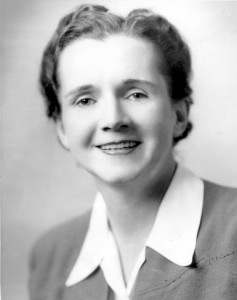 ook “Silent Spring,” written in 1962 by Rachel Carson (1907-1964) may be one of the most important warnings against the use of agricultural pesticides and herbicides written in the 20th century. She was one of the first to question man’s inclination to control nature and decide who and what dies and when. Through story telling and scientific research, Carson showed that all biological systems are dynamic and that interfering with synthetic chemicals would cause problems elsewhere. The stories told in Carson’s book catalog the complicated consequences of what has become known as conventional farming. Those stories are why we (The Natural Grocery Company) have been committed to buying organic products for decades. We support agricultural practices that foster the brief picture of life painted in her stories before the advent of chemical additions. That life is bucolic, serene, abundant, healthy, green and ever-changing. In the pages leading up to her story, Carson includes the following quote. It is an important one to remember.
ook “Silent Spring,” written in 1962 by Rachel Carson (1907-1964) may be one of the most important warnings against the use of agricultural pesticides and herbicides written in the 20th century. She was one of the first to question man’s inclination to control nature and decide who and what dies and when. Through story telling and scientific research, Carson showed that all biological systems are dynamic and that interfering with synthetic chemicals would cause problems elsewhere. The stories told in Carson’s book catalog the complicated consequences of what has become known as conventional farming. Those stories are why we (The Natural Grocery Company) have been committed to buying organic products for decades. We support agricultural practices that foster the brief picture of life painted in her stories before the advent of chemical additions. That life is bucolic, serene, abundant, healthy, green and ever-changing. In the pages leading up to her story, Carson includes the following quote. It is an important one to remember.
“I am pessimistic about the human race because it is too ingenious for its own good. Our approach to nature is to beat it into submission. We would stand a better chance of survival if we accommodated ourselves to this planet and viewed it appreciatively, instead of skeptically and dictatorially.” -E.B. White
From her website (www.rachelcarson.org):
Carson’s passionate concern in Silent Spring is with the future of the planet and all life on Earth. She calls for humans to act responsibly, carefully, and as stewards of the living earth.
Additionally Silent Spring suggested a needed change in how democracies and liberal societies operated so that individuals and groups could question what their governments allowed others to put into the environment. Far from calling for sweeping changes in government policy, Carson believed the federal government was part of the problem. She admonished her readers and audiences to ask “Who Speaks, And Why?” and therein to set the seeds of social revolution. She identified human hubris and financial self-interest as the crux of the problem and asked if we could master ourselves and our appetites to live as though we humans are an equal part of the earth’s systems and not the master of them.


